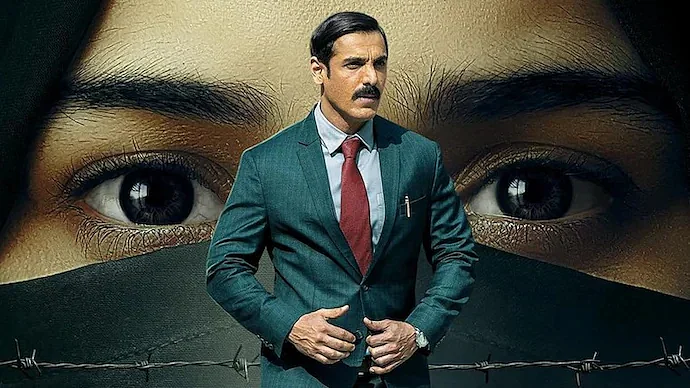'The Diplomat' Review: John Abraham & Sadia Khateeb Light Up a Confused Plot
'The Diplomat' will hit theatres on 14 March.

advertisement
Stories of valour make for great cinema. There’s something inherently magnetic about watching people overcome all odds, sometimes overbearing, impossible odds, to do the unthinkable. We are, perhaps then, lucky as an audience that valour is never in short supply.
Shivam Nair’s The Diplomat is made up of several such acts – some in-the-moment, some drawn-out. A lengthy disclaimer before the film informs that the film is inspired by true events but takes ample creative liberty in its telling.
Uzma Ahmed (an evocative, measured Sadia Khateeb) is a 28-year-old woman who rushes to the window at the Indian Embassy in Pakistan pleading to be let in. After a brief hesitation, the worker buzzes her in only to come face to face with a diplomat, Deputy High Commissioner JP Singh (John Abraham).
The film’s intentions are never under question – the writers and directors make every attempt to tell Uzma’s story with sensitivity. Staying true to the core narrative, the film, for the most part, doesn’t add in unnecessary elements to distract from the plot. Other than a subplot about Singh’s equation with his family sticking out like a sore thumb – primarily because the film doesn’t spend much time building his backstory – the narrative remains crisp and gripping.
Amid a tense political standoff, further complicated by Uzma’s husband Tahir’s insistence that she’s being kept at the embassy against her will, Singh tries to navigate the diplomatic channels at his disposal to help Uzma return to India.
The film’s most glaring flaw is a push-and-pull between the idea on paper and its execution. It’s clear that the makers have made the commendable decision to let the story do all the talking – there’s little reliance on heavy exposition and chest-thumping jingoism to get their point across. But there are parts where The Diplomat feels dry, for lack of a better word.
The emotions are there, lurking in the margins and end notes of the script, but they don’t make it to the screen. A story like this has all the potential to become a nail-biting thriller but the narration doesn’t realise that potential. Some thrillers benefit from cut-to-cut high octave action scenes, others benefit from a build-up. The Diplomat is the latter.
The makers rarely let a scene build up and create the tension the audience needs before moving to the next scene. Even with Khateeb’s measured performance, her scenes feel rushed – almost like the film is impatient to get to the next scene, to the next move, the next ‘reveal’. This impatience costs them.
Abraham’s performance might be one of his career’s best – he plays Singh with a simplicity and restraint far removed from the guns-blazing action we’ve come to expect. Jagjeet Sandhu as Tahir, however, is the actor to watch out for. The utter conviction with which he brings Tahir to the screen with barely restrained malice brilliantly compliments Khateeb’s act. It’s their contrasting, but compelling, performance that allows Uzma’s plight to become an undercurrent.
The Diplomat is at its best when we see the way Singh and those around him operate – from late night calls to the Foreign Minister (Revathy as Sushma Swaraj) to a lawyer standing by a bridge in a bright, yellow beat down car. Every time they take a step forward, there’s a new knot to untangle – right when victory is within their grasp, something seemingly unrelated throws a wrench in their plans.
The film doesn’t bother itself with the bigger, international implications of Singh’s actions. It gestures instead at the implications of Uzma’s ordeal – of what makes her vulnerable to the situation she finds herself in. It’s a pity then that the film doesn’t seem to dwell too long on the reality of gendered violence – instead Singh makes an off-handed comment about feminism that seems both out of character and context.
There are hints at the quiet understanding that passes between the female officers at the embassy and Uzma but, like most things, the scenes don’t get enough time to build. And so the wins, the catharsis feel slightly hollow.
When a character reaches to another for comfort, you feel it because that’s what you’re wired to do, not because the story builds it up for you.
And without this investment in nuance and characterisation, the film makes an obvious misstep. An entire locality is reduced to the violence Tahir & his crew metes out – the sociopolitical context is absent. Even bureaucrats from both sides don’t get enough say – the film devolves from being a biting diplomatic thriller to the same cat-and-mouse chase we’ve seen time and time again.
Diplomacy is a tightrope walk; the art of balance and negotiation. The intrigue of a diplomatic standoff comes from a battle of wits but without a worthy, well-sketched-out adversary, the Herculean task Singh is straddled with loses some of its impact.
The writing seldom crackles with the intensity you expect from a story like this even as the actors try (and partly succeed) in keeping the audience invested. The Diplomat isn’t dull or boring by any means – it just falls short of being the cinematic experience it could have been.